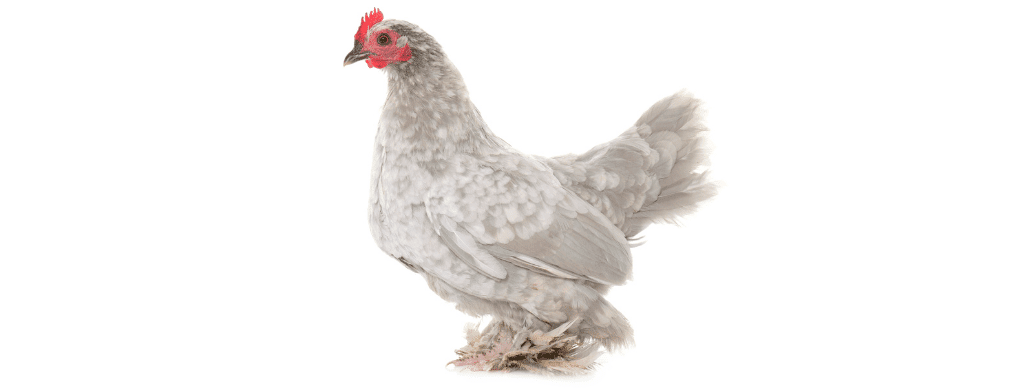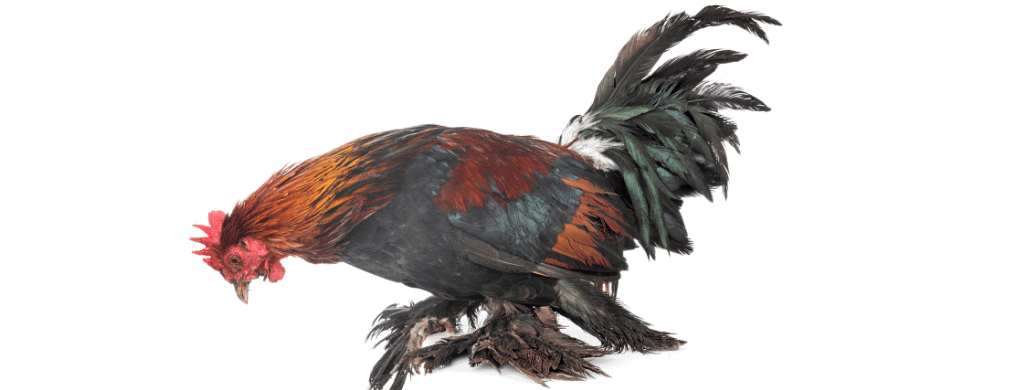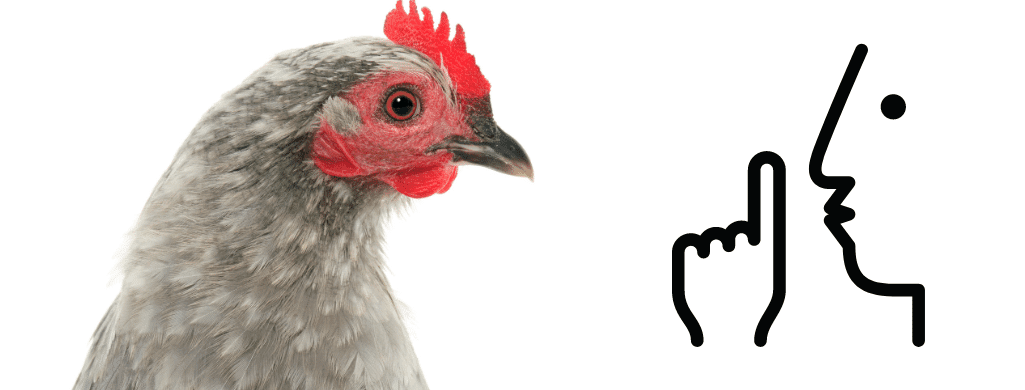Popular for its friendly personality and wide color varieties, the Booted Bantam is a common pet chicken.
The Bantam breed is also commonly used as exhibition birds thanks to its variety of colors and upright comb, but are they noisy and annoying chickens?
Booted Bantams aren’t any noisier than other chickens, though their sounds are a little higher in pitch. In terms of chattiness, they actually make noise less often than some of their feathered counterparts.
So, do you need to worry about a Booted Bantam waking up your neighbors?
Most likely not. Yet, every type of chicken is bound to make noise occasionally.
Let’s dive in and talk about this not-so-usual chicken’s noise level.

Table of Contents
ToggleAre Booted Bantams Noisy?
No, the Bantam breed is not known to be noisy. This is especially true when they are compared to larger chicken breeds.
Both True Bantams and Miniature Bantams are so quiet, thanks to selective breeding.
Unlike most standard chickens, the Booted Bantam was bred to be a show bird and a beloved pet. Bantams are also not meat chickens and are not relied on for their egg production.
All of this means farmers have not owned Bantams for quite some time. After all, they are too small to be a meat breed and also poor layers.
Since most Booted Bantam owners live in cities and towns, they need to be quieter.
To meet this requirement, Bantam chicken breeders selectively bred this ornamental breed to be as quiet as possible.
Their primary use as a pet has also led to their fashionable single comb and a wide variety of colors.
Are Booted Bantam Hens Quieter Than Roosters?
Yes, Booted Bantam hens tend to be quieter than roosters.
This is not surprising to most chicken owners since most chicken breeds have roosters louder than hens.
Still, a rooster crow will be pretty quiet for this breed of chicken. This is thanks to these miniature chickens’ small size.
The smaller the overall size of the chicken is, the quieter they are usually going to be. This is definitely true for Booted Bantams.

Why are my Booted Bantams Being Loud?
Even though this lovely chicken is quieter than average, it occasionally makes noise.
After all, no chicken is 100% quiet. Here are some reasons why your Booted Bantam is making noise.
It’s Egg Laying Time
Chickens will sing the “egg song” when laying their eggs. Bantam hens will have very small chicken eggs, and these adept mothers are poor layers.
Yet, they are still likely to lay once or twice a week.
So, if your hen is making lots of noise one to two times a week, this is likely why. This is especially true when hens are hanging out in their nesting boxes.
You Have a Broody Hen
Since Booted Bantams are not bred for humans to consume their chicken eggs, Bantam hens get broody fairly often.
This is especially true during their mating season.
Unfortunately, broody hens are often much noisier than content ones.
They may even bob their heads at you when they see you!
Related: All The Reasons Chickens Bob Their Heads
Luckily, Booted Bantam hens tend to make attentive mothers. Allowing your Booted Bantam to sit on its fertilized Bantam eggs will quiet them down.
Purchasing fertilized Bantam eggs from a supplier for your broody hen is also an option. This is an especially good choice if you do not have a Booted Bantam rooster.
However, you may want to sell your Bantam chicks once they are old enough. This will keep your flock quieter and more manageable.
The good news is you will likely have some luck selling your chicks as pets, thanks to the breed’s ornamental purposes.
Something is Scaring Your Chickens
Frightened chickens will always make a lot of commotion. Sadly, these miniature chickens are an easy target for predators thanks to their delicate frames.
So, if your chickens are making a lot of noise, it is a good idea to check for predators.
Coyotes, foxes, raccoons, and bobcats are all common predators for chickens. Even domesticated dogs and cats could threaten the tiny Booted Bantam.
You Need to Let Your Chickens Out
Even this perfect chicken will need to be taken care of. Many chicken keepers will keep their Bantam varieties in indoor enclosures.
This is because these social birds are not well suited for cold climates.
Since many Bantams are kept indoors overnight for their safety, these not-so-hardy birds often start to make noise in the morning.
They usually do this when they want to go out and forage or explore. Booted Bantams also enjoy dust baths outside.
Your Chickens are Hungry
These popular chickens will also start to make noise when they need food or fresh water. Rising early to feed and water your Booted Bantams will help keep these feather-legged birds quiet.

How to Quiet Down Your Booted Bantams
Luckily there are ways to keep this active bird pretty quiet.
Keeping your flock manageable and caring for your Booted Bantams on a consistent schedule will help quiet down this popular variety of chickens.
Here are some tips for keeping your backyard chickens quiet.
Tend to Your Chickens on a Schedule
Even the perfect chicken will start to make noise when they get hungry.
Tending to your Booted Bantams on a set schedule regularly will help keep noise levels down, especially in the mornings.
This is particularly important for backyard chickens, as they could upset neighbors if they get too loud.
Don’t Have Roosters in Your Flock
Even with small-size roosters, Booted Bantam flocks with roosters will be noisier than those without. As a result, not having roosters will keep the noise level down.
This is an especially good idea for those who are not looking to breed this active chicken breed.
It is always best to stick to hens if you want a quiet pet with fluffy feathers.
Plus, Bantam chicks could potentially make things noisier as well. This is especially true if you do not have a way to sell them.
Keep Your Flock Small
Keeping your flock of this not-so-hardy chicken at a small and manageable size will also reduce their noise.
This is because a large group of chickens gets noisy, even with this friendly bird’s soft voice. A large Booted Bantam flock is also difficult to keep if you don’t live in a warm climate.
Selling off any extra Bantam chicks is a good rule of thumb. This will keep the size of your flock small and allow your hens to be attentive mothers.
Plus, you will likely make some extra money due to the breed’s high demand. You may even enjoy the breed’s wide and rich color varieties.
Give Your Chickens a Safe Haven When They Feel Threatened
Booted Bantams are not suited for cold climates.
As a result, most Bantam owners will have a sheltered space for them. Ensuring your Booted Bantams have access to a sheltered area at all times is crucial.
This is because a shelter will provide this not-so-hardy chicken with a safe haven.
This shelter will preferably have more defenses against predators like cage fencing or chicken wire.
Of course, this is only if you keep your Booted Bantams in a chicken coop, not a barn or outdoor building.
How useful was this post?
Click on a star to rate it!
We are sorry that this post was not useful for you!
Let us improve this post!
Tell us how we can improve this post?
